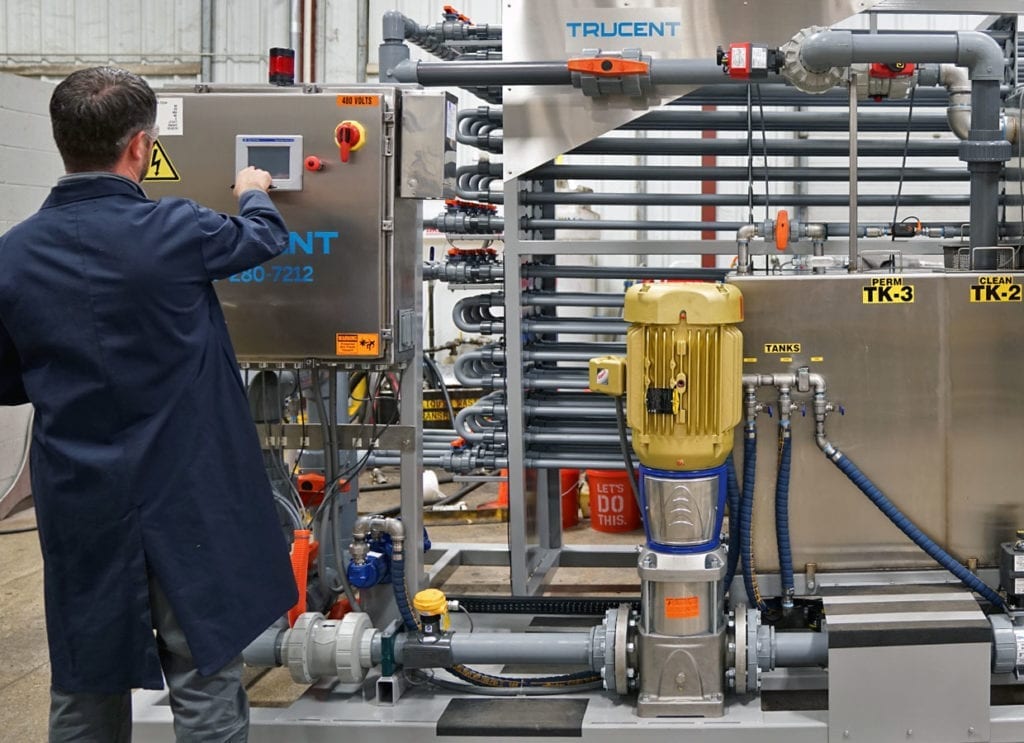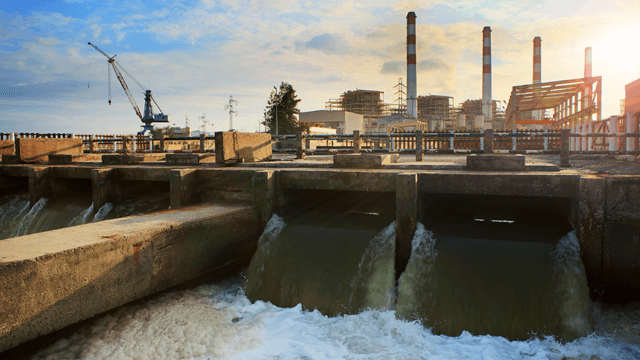Industrial Waste Water Treatment-- Advanced Solutions for Cleanser Effluents
Industrial Waste Water Treatment-- Advanced Solutions for Cleanser Effluents
Blog Article
The Function of Industrial Waste Water Therapy in Environmental Security
The efficient therapy of commercial wastewater is significantly acknowledged as a cornerstone of environmental defense, offering to reduce the destructive effects of pollutants on aquatic ecosystems. As industries advance and increase, the requirement for robust wastewater management services ends up being vital to guarantee compliance with environmental policies and promote sustainable techniques. This necessitates a better exam of the therapy refines used and their effects for both ecological health and source recuperation. Comprehending these characteristics increases critical inquiries concerning the equilibrium in between commercial development and eco-friendly honesty, prompting more exploration of the paths forward.
Value of Drainage Therapy
The value of wastewater treatment can not be overemphasized, as it plays an important duty in protecting public wellness and the environment (Industrial Waste Water Treatment). Reliable wastewater treatment systems are essential for getting rid of contaminants from commercial discharge, therefore stopping harmful materials from going into all-natural water bodies. This process minimizes the danger of waterborne illness, which can develop from neglected wastewater, and safeguards community wellness
Furthermore, dealt with wastewater can be safely recycled in various applications, such as watering and industrial processes, promoting sustainable water administration practices. By reusing water, sectors can significantly minimize their freshwater consumption, contributing to resource preservation.
In addition to wellness advantages, wastewater therapy is important for protecting water environments. Toxins in unattended wastewater can lead to the destruction of water top quality, hurting water life and interrupting environmental equilibriums. By treating wastewater prior to discharge, industries assist preserve the integrity of regional ecosystems and advertise biodiversity.
In addition, governing conformity is a crucial aspect of wastewater administration. Following established ecological requirements not only stays clear of legal consequences yet additionally improves a firm's track record as a responsible corporate resident. Essentially, reliable wastewater treatment is crucial for protecting public health and wellness, safeguarding the environment, and promoting lasting industrial techniques.

Resources of Hazardous Waste Water
Industrial wastewater originates from a selection of resources, each contributing to the intricacy of therapy processes. Primarily, these sources consist of producing facilities, refineries, and processing plants, which produce effluents as a result of their operations. Industries such as fabrics, drugs, food and drink, and petrochemicals create substantial volumes of wastewater, frequently loaded with pollutants consisting of hefty steels, natural compounds, and nutrients.
In enhancement to manufacturing, farming activities add to commercial wastewater via drainage and effluent from animals procedures and crop handling. The meat and dairy industries, in specific, are known for launching high degrees of biochemical oxygen need (FIGURE) and virus.
In addition, mining and mineral processing tasks produce wastewater having suspended solids and unsafe chemicals. Power generation plants, particularly those making use of nonrenewable fuel sources, likewise add wastewater via cooling down systems and chemical cleaning processes.
Each of these sources offers special challenges concerning the structure and quantity of wastewater created, necessitating tailored treatment options to mitigate their environmental influence. Comprehending the diverse origins of industrial wastewater is important for establishing reliable administration strategies aimed at protecting water sources and advertising sustainable industrial techniques.
Treatment Processes and Technologies
Reliable therapy processes and technologies are crucial for managing industrial wastewater and minimizing its environmental impact. Different methods are utilized to Industrial Waste Water Treatment remove contaminants, adapt to different wastewater attributes, and follow governing requirements.
Physical treatment procedures, such as sedimentation and filtration, help with the elimination of put on hold solids. These techniques are often used as initial steps to minimize the load on subsequent treatment phases. Chemical treatment, including coagulation, neutralization, and flocculation, addresses dissolved contaminants by changing their chemical residential properties, making them much easier to separate from water.
Biological treatment modern technologies, such as turned on sludge systems and biofilters, utilize microbes to break down raw material and nutrients. These approaches are especially reliable for biodegradable waste streams, advertising the all-natural decay procedure. Advanced treatment technologies, such as membrane layer purification and progressed oxidation procedures, deal improved elimination performances for difficult toxins, consisting of heavy steels and consistent organic substances.
Each of these therapy procedures can be configured in various mixes to produce tailored remedies that fulfill specific commercial needs. The option of innovation depends upon variables such as the kind of wastewater, preferred therapy outcomes, and economic factors to consider, making sure that markets can operate sustainably while lessening their environmental footprint.
Ecological Benefits
Implementing durable wastewater therapy refines not only makes certain conformity with regulatory requirements however also produces significant environmental advantages. Efficient treatment of industrial wastewater decreases the discharge of hazardous pollutants into all-natural water bodies, thereby securing water ecosystems. By getting rid of harmful materials, heavy metals, and pathogens, these processes assist preserve biodiversity and advertise much healthier ecosystems.
In addition, treated wastewater can be repurposed for numerous applications, including watering and commercial processes, decreasing the demand for fresh water sources. This reuse not just more helpful hints conserves water however also decreases the stress on local water products, which is especially vital in water-scarce regions.
In addition, effective wastewater therapy mitigates the risk of soil and groundwater contamination, making certain the stability of local atmospheres. Industrial Waste Water Treatment. By preventing the seepage of harmful materials, industries add to the total health and wellness of surrounding communities and ecosystems, enhancing public trust fund and promoting lasting industrial methods
Regulatory Structure and Compliance
A detailed regulative framework regulates the treatment of industrial wastewater, ensuring that markets stick to rigorous conformity requirements. Various nationwide and regional policies, such as the Clean Water Act in the USA, established forth limits on the discharge of pollutants into water bodies. These laws are made to shield water ecosystems and public wellness by mandating that industries apply proper treatment technologies.
Compliance with these regulations often includes getting authorizations, conducting regular tracking, and reporting discharge degrees to regulative authorities. Failing to comply can cause considerable charges, consisting of fines and operational limitations, thus incentivizing sectors to adopt ideal practices in wastewater management.
In addition to governmental policies, numerous markets additionally comply with voluntary criteria check my blog and qualifications, such as ISO 14001, which promote lasting ecological administration practices. Furthermore, stakeholders are significantly advocating for improved openness and accountability in wastewater administration, pressing for more stringent enforcement and even more rigorous reporting demands.
Ultimately, a durable regulatory framework not just offers to minimize ecological risks however additionally cultivates a culture of sustainability within the commercial market, motivating constant enhancement in wastewater therapy procedures.
Verdict

The reliable therapy of commercial wastewater is progressively recognized as a keystone of ecological protection, serving to mitigate the destructive effects of toxins on water communities. Efficient wastewater treatment systems are necessary for getting rid of impurities from industrial discharge, consequently preventing unsafe materials from getting in all-natural water bodies.Industrial wastewater stems from a range of sources, each adding to the intricacy of treatment processes. Effective treatment of commercial wastewater minimizes the discharge of hazardous contaminants right into natural water bodies, therefore protecting marine ecological communities.In conclusion, commercial wastewater therapy is essential for protecting environmental integrity and advertising lasting water management.
Report this page